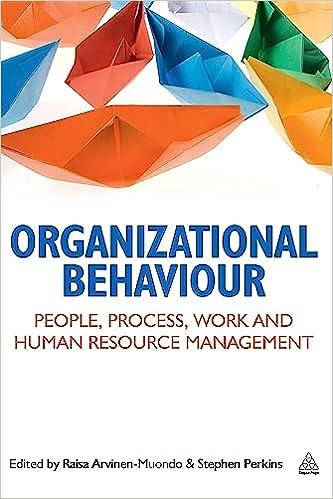James was a team leader of a small group dealing with motor vehicle insurance in a company
Question:
James was a team leader of a small group dealing with motor vehicle insurance in a company providing commercial insurance and financial advice. He had been with the company for six years, and three years ago was promoted to team leader, showing a lot of early promise. But James was unhappy with his line manager, Paul. ‘When he took over as line manager two years ago,’ says James, ‘we were having problems with a couple of members of the team, who were not performing well, and who were a disruptive influence. My line manager was not happy with the fact that it took a long time to resolve the problems, and that team performance suffered. Paul didn’t realize how careful you have to be if you want to discipline and dismiss someone. After that he always saw me as a poor team leader; he was constantly on my back, watching me and checking up on me. He just didn’t let me run the team in the way I would have liked to.’
James went on to say that his line manager told him that he was weak, and not good at motivating his team. Paul often sat in on team meetings, talking directly to the team, undermining James’ authority. He wanted to see target and performance figures regularly, and spent a lot of time telling James how to run his team, and how to get the best out of the team members. James started to doubt his own abilities and became an inconsistent team leader, sometimes coaching and supporting team members, sometimes criticizing and threatening them, particularly after he had had a difficult session with Paul.
The team members were unhappy, not sure whether to trust James, or see him as a failure, as his line manager did. They resented his inconsistent behaviour. One member of the team left, several attempted to move to other departments, and performance was poor.
Paul had been appointed from outside the organization and had built up a good record of getting teams to work hard and productively. By this point he was fed up with James, and had decided to get rid of him. ‘He was too concerned with being liked by his team. He couldn’t push them, or deal with poor performers. I couldn’t rely on him to get work done, and I had to spend a lot of time monitoring him and the team. I had to set targets, and check performance. If I left the team to itself it wouldn’t perform. I hadn’t got the time to keep telling this team what to do but I just didn’t trust James to performance manage this team effectively on his own.’
Discussion questions
● Why do you think the relationship between James and his line manager Paul had become so difficult?
● Without intervention what do you think would have happened?
● If you had been asked to advise on what actions to take that would have avoided James leaving the organization and to ensure the team worked more effectively, what would you have proposed?
Step by Step Answer:

Organizational Behaviour People Process Work And Human Resource Management
ISBN: 9780749463601
1st Edition
Authors: Stephen J Perkins, Raisa Arvinen-Muondo





